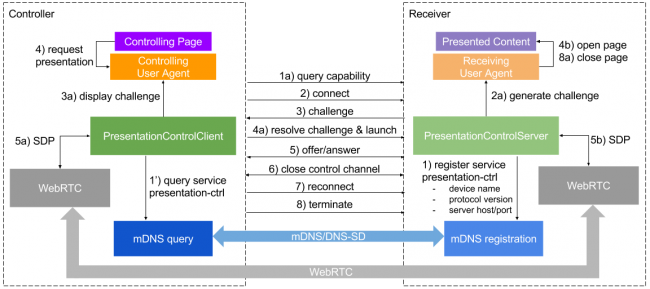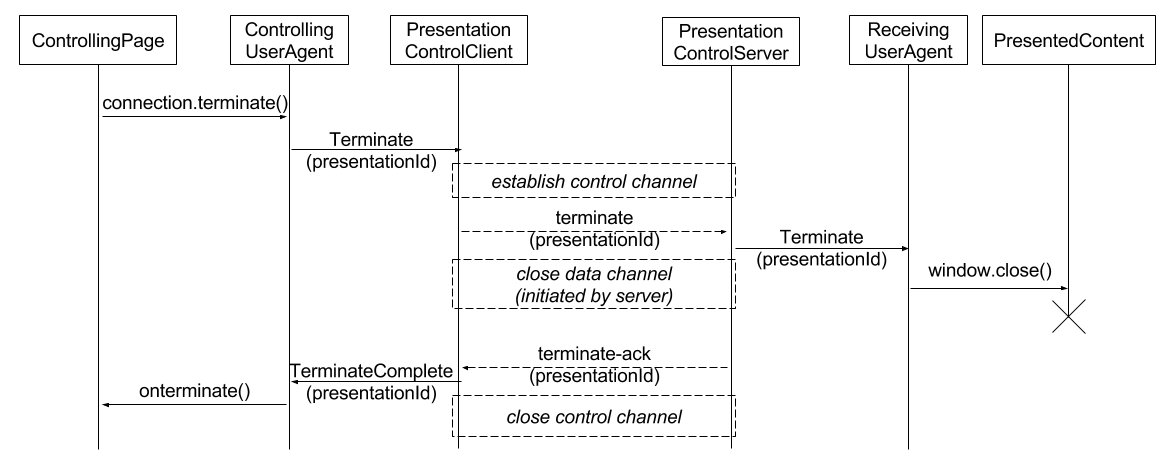WebAPI/PresentationAPI:Protocol Draft: Difference between revisions
< WebAPI
Jump to navigation
Jump to search
(→Architecture: add details for each components) |
(add sequence diagram) |
||
| Line 43: | Line 43: | ||
== Protocol Details == | == Protocol Details == | ||
=== | === Service Discovery === | ||
[[File:Draft Protocol Service Discovery.png]] | |||
=== Device Pairing === | |||
=== Establish Control Channel === | |||
=== Start Presentation === | |||
* STEP 1: find device (mDNS/DNS-SD: _presentation-ctrl._tcp) | * STEP 1: find device (mDNS/DNS-SD: _presentation-ctrl._tcp) | ||
** STEP 1a: query device capability (send query message: supported media type, supported URL format) | ** STEP 1a: query device capability (send query message: supported media type, supported URL format) | ||
| Line 52: | Line 56: | ||
** STEP 4a: establish DataChannel via SDP | ** STEP 4a: establish DataChannel via SDP | ||
* STEP 5: close control channel (send close message: ) | * STEP 5: close control channel (send close message: ) | ||
[[File:Draft Protocol Start Presentation.png]] | |||
=== Terminate === | === Establish Data Channel === | ||
[[File:Draft Protocol Establish Data Channel.png]] | |||
=== Terminate Presentation === | |||
* STEP 1: setup control channel to remote device (send connect message: auth token) | * STEP 1: setup control channel to remote device (send connect message: auth token) | ||
** STEP 1a: complete challenge with stored information | ** STEP 1a: complete challenge with stored information | ||
* STEP 2: terminate app / page via session Id (send terminate message: session Id) | * STEP 2: terminate app / page via session Id (send terminate message: session Id) | ||
* STEP 3: close control channel (send close message: ) | * STEP 3: close control channel (send close message: ) | ||
[[File:Draft Protocol Terminate Presentation.png]] | |||
=== | === Close Connection === | ||
[[File:Draft Protocol Close Connection.png]] | |||
=== Resume Connection === | |||
* STEP 1: setup control channel to remote device (send connect message: auth token) | * STEP 1: setup control channel to remote device (send connect message: auth token) | ||
** STEP 1a: complete challenge with stored information | ** STEP 1a: complete challenge with stored information | ||
| Line 66: | Line 74: | ||
** STEP 3a: establish DataChannel via SDP | ** STEP 3a: establish DataChannel via SDP | ||
* STEP 4: close control channel (send close message: ) | * STEP 4: close control channel (send close message: ) | ||
[[File:Draft Protocol Resume Connection.png]] | |||
== References == | == References == | ||
* [https://github.com/w3c/presentation-api/blob/gh-pages/interoperability.md Protocol suggestion by Second Screen WG] | * [https://github.com/w3c/presentation-api/blob/gh-pages/interoperability.md Protocol suggestion by Second Screen WG] | ||
* [https://github.com/mfoltzgoogle/freeplay/blob/master/architecture.md Architecture proposed by Google] | * [https://github.com/mfoltzgoogle/freeplay/blob/master/architecture.md Architecture proposed by Google] | ||
Revision as of 08:51, 1 April 2016
This is a draft of protocol proposal for 2-UAs Presentation Scenario
Requirement
- Device Discovery
- Device information: unique name, user-friendly name, address for ctrl server
- Device capability: resolution, supported media type, supported apps, supported IO capability
- Protocol information: protocol version
- Service Launching
- Service information: app/page URL
- Session information: session Id, bootstrap info for communication
- Controlling message: launch, reconnect, terminate
- User settings: preferred locale
- Communication
- establish dedicate transportation channel
- Security
- device challenge: OOB channel, passkey
- data encryption: key derived from challenge, key exchange for communication channel
Architecture
Here is the high-level architecture overview of 2-UAs protocol
PresentationControlClient
- query for available PresentationControlServer
- query device capability for device filtering
- initiate connection to server
- trigger session creation / reconnection / termination
- reply to device challenge during pairing procedure
PresentationControlServer
- register as an service profile on mDNS
- handle session creation / reconnection / termination
- generate device challenge for pairing procedure
mDNS Registration
- mDNS stack that supports service registration over mDNS protocol
mDNS Query
- mDNS stack that supports service query over mDNS protocol
WebRTC
- WebRTC stack that provides Data Channel implementation
- Generate SDP for exchanging offer/answer over presentation control protocol
Browser UI
- display pairing information
- display sender / receiver page
Protocol Details
Service Discovery
Device Pairing
Establish Control Channel
Start Presentation
- STEP 1: find device (mDNS/DNS-SD: _presentation-ctrl._tcp)
- STEP 1a: query device capability (send query message: supported media type, supported URL format)
- STEP 2: setup control channel to remote device (send connect message: device name, protocol version, supported challenge method)
- STEP 2a: device challenge / device pairing (send challenge message: ) (send resolve message: ) (send auth message: encrypted auth token)
- STEP 3: launch app / page (send launch message: url, session Id)
- STEP 4: setup communication channel (send offer message: SDP for DataChannel) (send answer message: SDP for DataChannel)
- STEP 4a: establish DataChannel via SDP
- STEP 5: close control channel (send close message: )
Establish Data Channel
Terminate Presentation
- STEP 1: setup control channel to remote device (send connect message: auth token)
- STEP 1a: complete challenge with stored information
- STEP 2: terminate app / page via session Id (send terminate message: session Id)
- STEP 3: close control channel (send close message: )
Close Connection
Resume Connection
- STEP 1: setup control channel to remote device (send connect message: auth token)
- STEP 1a: complete challenge with stored information
- STEP 2: reconnect app / page via session Id (send reconnect message: session Id)
- STEP 3: setup communication channel (send offer message: SDP for DataChannel) (send answer message: SDP for DataChannel)
- STEP 3a: establish DataChannel via SDP
- STEP 4: close control channel (send close message: )






